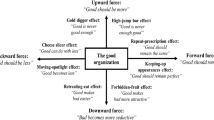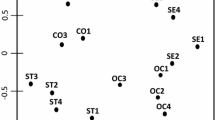Abstract
Studies consistently report that individuals believe they are far more ethical than co-workers, superiors, or managers in other firms. The present study confirms this finding when comparing undergraduate students' own ethical standards to their perceptions of the standards held by most managers or supervisors. By maintaining a “holier than thou” ethical perception, new and future managers might rationalize their unethical behavior as being necessary for success in an unethical world. A prisoner's dilemma type problem can be said to exist when choosing an unethical behavior becomes each player's dominant strategy and the interaction of dominant behaviors is Pareto inferior. Dispelling the “holier than thou” perception may encourage students to revise their personal behavior payoffs such that the collective benefits that emanate from ethical conduct are favored and the prisoner's dilemma problem is converted into a coordination problem.
Similar content being viewed by others
References
AICPA Future Issues Committee: 1984, Major Issues for the CPA Profession and the AICPA (American Institute of Certified Public Accountants, New York).
Arlow, Peter and Thomas A. Ulrich: 1980, ‘Business Ethics, Social Responsibility and Business Students: An Empirical Comparison of Clark's Study’, Akron Business and Economic Review 11 (Fall), 17–23.
Axelrod, Robert: 1984, The Evolution of Cooperation (Basic Books, New York).
Baumhart, R. C.: 1961, ‘How Ethical Are Businessmen?’, Harvard Business Review 39 (July–August), 6–8.
Brenner, S. N. and E. A. Molander: 1977, ‘Is the Ethics of Business?’, Harvard Business Review 55 (January–February), 57–71.
Daniel, Wayne W.: 1978, Applied Nonparametric Statistics (Houghton Mifflin, Boston).
Elster, Jon.: 1989, The Cement of Society: A Study of Social Order (Cambridge University Press, New York).
Ferrell, O. C. and K. Mark Weaver: 1978, ‘Ethical Beliefs of Marketing Managers’, Journal of Marketing 42 (July), 69–73.
Gauthier, David: 1986, Morals By Agreement (Oxford University Press, New York).
Hollon, Charles J. and Thomas A. Ulrich: 1979, ‘Personal Business Ethics: Managers vs Managers-To-Be’, Southern Business Review 5, 17–22.
Kavla, G. S.: 1983, ‘When Two ‘Wrongs’ Make a Right: An Essay on Business Ethics’, Journal of Business Ethics 2, 61–66.
Kidwell, Jeaneen M., Robert E. Stevens, and Art L. Bethke: 1987, ‘Differences in Ethical Perceptions Between Male and Female Managers: Myth or Reality’, Journal of Business Ethics 7, 489–493.
Leibenstein, Harvey: 1987, Inside the Firm, Cambridge, MA: Harvard University Press.
McDonald, Gael M. and Raymond A. Zepp: 1988, ‘Ethical Perceptions of Hong Kong Chinese Business Managers’, Journal of Business Ethics 7, 835–845.
Newstrom, John W. and William A. Ruch: 1975, ‘The Ethics of Management and the Management of Ethics’, MSU Business Topics (Winter), 29–37.
Pitt, L. F. and R. Abratt: 1986, ‘Corruption in Business: Are Management Attitudes Right?’, Journal of Business Ethics 5, 39–44.
Posner, Barry Z. and Warren H. Schmidt: 1984, ‘Values and the American Manager’, California Management Review 26 (Spring), 202–216.
Stevens, G. E.: 1984, ‘Business Ethics and Social Responsibility: The Responses of Present and Future Managers’, Akron Business and Economic Review 15 (Fall), 6–11.
Author information
Authors and Affiliations
Additional information
Thomas Tyson is Associate Professor of Accounting at St. John Fisher College. His articles have been published in a number of professional and academic accounting journals. Two of his Management Accounting publications received Certificate of Merit awards “for outstanding character and excellence in contributing to the literature of management accounting.”
Rights and permissions
About this article
Cite this article
Tyson, T. Believing that everyone else is less ethical: Implications for work behavior and ethics instruction. J Bus Ethics 9, 715–721 (1990). https://doi.org/10.1007/BF00386354
Issue Date:
DOI: https://doi.org/10.1007/BF00386354




